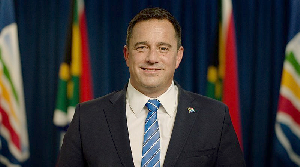- Home - News
- TWI News | TV
- Polls
- Year In Review
- News Archive
- Crime & Punishment
- Politics
- Regional
- Editorial
- Health
- Ghanaians Abroad
- Tabloid
- Africa
- Religion
- Election 2020
- Coronavirus
- News Videos | TV
- Photo Archives
- News Headlines
- Press Release
General News of Monday, 2 June 2008
Source: GNA
Huge populations in Africa still without access to water
Accra, June 2, GNA - Huge populations in Africa do not have access to improved water supply, Mr Minta Aboagye, Head of the Water Directorate of the Ministry of Water Resources Works and Housing, said on Monday.
He said about 340 million people on the continent were in this category, although about 86 per cent of urban population had access to good drinking water while 48 per cent of rural dwellers could boost of improved water systems.
Mr Aboagye said this at the opening of a three-day International Symposium on Household Water Management and the Fourth Annual Meeting of the International Network to Promote Household Water Treatment and Safe Storage underway in Accra.
He said in 2006 the quality of urban water declined by one per cent while rural supply improved by 56 per cent in Ghana. "There has been increasing support for interim measures to improve household drinking water quality through home management." Dr Bonifacio Magtibay, Technical Officer, World Health Organisation (WHO), said the symposium would consolidate effective strategies for addressing barriers in introducing and scaling up household water treatment systems at the country level and how it could be applied in African regions and other developing countries. Country representatives at the symposium would also discuss innovative strategies and practices for introducing and scaling up implementation, provide updates on key developments with key partners, identify barriers, drivers and key action points for implementation and scaling up household water in Ghana.
Dr Magtibay said participants would also be equipped with the technology and practices on safe drinking water storage and how to apply emerging technologies in their respective country. Kenya and Ethiopia shared their success stories. Kenya, to avoid the high level of cholera cases, has adopted the distribution of purifiers, community sensitization, strengthening water quality surveillance, research and collaboration as some interventions. Ethiopia recorded an increase of 51 per cent in 2007 as against 20 per cent in treated water supply.
Major Courage Quashigah (Rtd), Minister of Health, stressed the need to properly handle treated water adding that about 40 per cent of treated water was used for WC, 15 per cent for laundry and five per cent for the kitchen. He said the practice must be halted to facilitate expansion works to rural areas.
The network also works to improve the health of vulnerable populations through improved point-of-use water management in contributing to the reduction of waterborne disease, promoting household water treatment and safe storage as a key component of water, sanitation and hygiene programmes. 2 June 08










